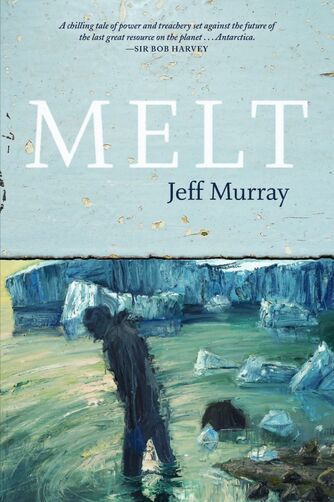
by Jeff Murray
This is a novel that works well at different levels and one that merits close attention, particularly as it has as its core theme the greatest current threat to humanity’s survival.
At one level it is a simple but harrowing tale, set in the near future, of a young Pacific Island woman whose homeland is being overcome by rising sea levels. She has been charged with advocating for her people, twenty thousand of them, in dealings with the New Zealand government over negotiations for resettlement here.
Her story unfolds in a wider world beset by troubles caused by climate change. A hundred million refugees from its effects are desperately seeking a place to re-settle. Three major northern hemisphere powers – The United States, China and India – are manoeuvring for advantage in Antarctica, where the ice is gradually retreating and old agreements restricting the exploitation of resources are being abandoned.
These great powers are all looking to establish close and dominant relationships with southern hemisphere countries such as Australia, New Zealand, Argentina and South Africa, so that they can establish large-scale bases in readiness for exploiting the great southern continent as the thaw makes it increasingly habitable and its resources more readily exploitable. Meanwhile, most of Europe is turning inwards, Russia is concentrating on establishing its dominance in the Arctic regions, and the United Kingdom has aligned itself with India.
Against this background the author gives us a kaleidoscope of motives operating amongst the various interests involved. There is greed and envy, fanaticism and arrogance, and an occasional glimpse of altruism. There is also subterfuge, and there are friendships that might not be friendships at all. Yet these features are related in a way that is not in the least hysterical. Indeed, it all seems almost mundanely inevitable, as so much that is described is little more than a continuation of what we see happening today.
The big issues emerge out of the narrative; out of the journeys of the young woman protagonist as she meets with New Zealand politicians, sails with eco-activists as they attempt to disrupt Japanese whaling ships, and finally travels to Antarctica to see for herself what is happening there and to discover whether it is perhaps here that her people can find a new home for themselves. The biggest issue of all is the conflict between the necessity for whole-hearted co-operation if humanity is to have a future at all, and geo-political rivalries, competing systems, and selfish ambitions.
The Antarctic itself can be seen as an emerging new world in the broadest sense – a last chance for humanity to redeem itself and establish a society that respects all of its kind and all its fellow earth dwellers and the earth itself. Indeed, there is much in this novel that can be interpreted as being allegorical.
Yet no definitive solutions to the problems raised are offered. In this sense, the novel is not polemical. In essence, it is a tragedy concerning a young woman doing what she can or feels she must do to allow her threatened people a future; a tragedy acted out against forces, both natural and human, that are far beyond her power to control.
This is an important book and one that provokes thought and a sense of urgency. The world it depicts could well be just around the corner. It is an intensely disturbing novel that even raises doubts as to whether or not humankind are worth saving at all; but it is also an engrossing read.
Author: Jeff Murray
Publisher: Mary Egan Publishing
ISBN: 9780473470531
RRP: $35.00
Available: print:www.jeffmurraybooks.com; http://www.unitybooksonline.co.nz/nz-fiction/nz-fiction/Melt
ebook:https://www.amazon.com/dp/B07S46BW9W

 RSS Feed
RSS Feed
